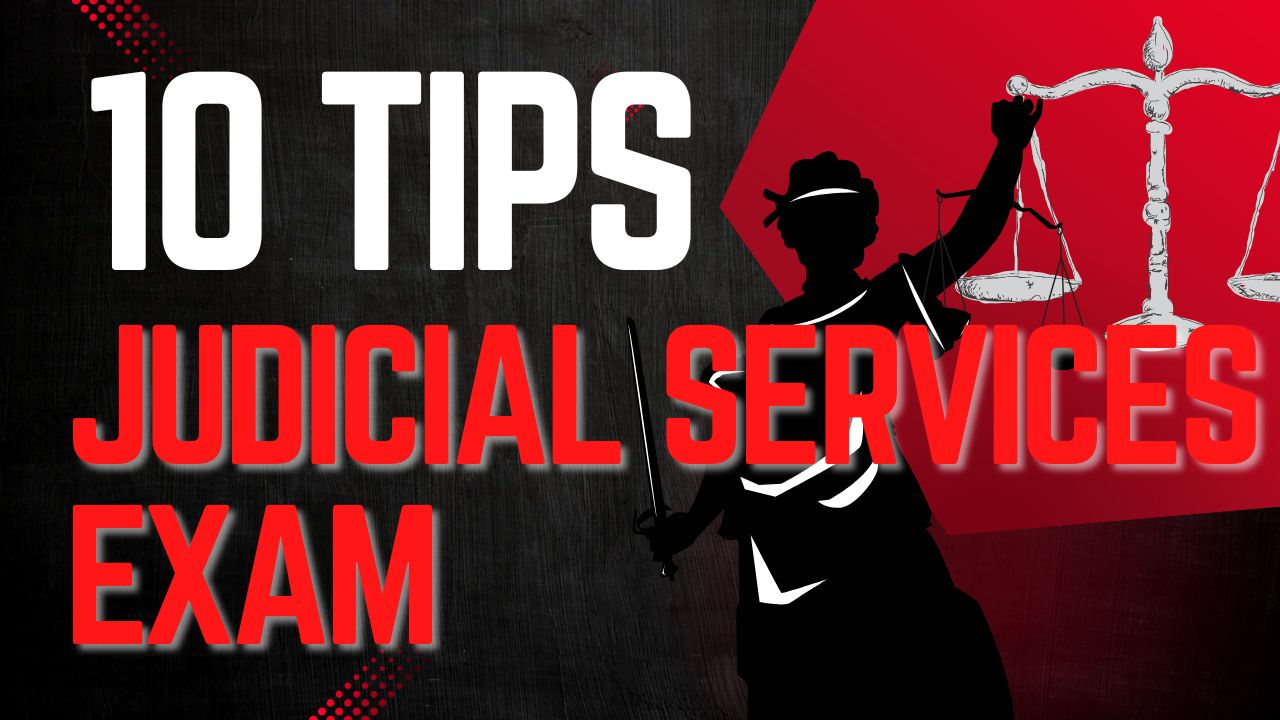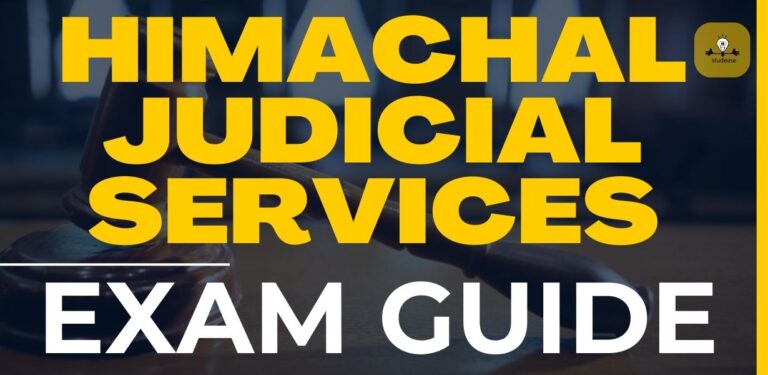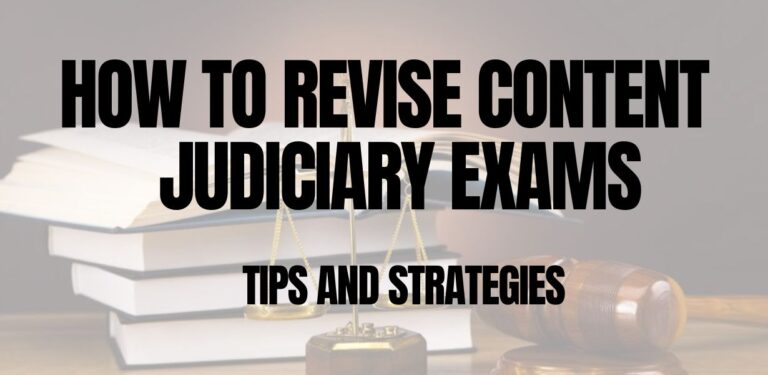10 TIPS JUDICIAL SERVICES EXAM 2025: Essential Strategies for Success

The Judicial Services Exam 2025 is an important step for those aiming to become judges. Success in this exam depends on effective study strategies, a strong grasp of legal principles, and well-developed writing skills. By following practical tips, candidates can enhance their preparations and boost their chances of clearing the exam.
Preparing for the Judicial Services Exam can feel overwhelming, but it doesn’t have to be. With a clear plan and focused study habits, anyone can navigate the requirements. Candidates should pay attention to exam formats, key legal topics, and case laws that may appear in questions.
Focusing on physical and mental health is equally important for candidates. Staying balanced ensures they remain sharp and ready for the challenges ahead. Keeping these points in mind can guide aspiring judges through their journey to success.
Key Takeaways
- A solid study plan is essential for success.
- Understanding case laws enhances legal knowledge.
- Health and well-being support effective exam preparation.
Understanding the Judicial Services Exam Format
Knowing the format of the Judicial Services Exam is crucial for effective preparation. This section covers the exam syllabus and question paper pattern.
Exam Syllabus Overview
The Judicial Services Exam covers various subjects. Candidates should be familiar with these key topics:
- Constitutional Law: Understand basic rights, duties, and the organization of the state.
- Criminal Law: Focus on offences, penalties, and relevant statutes.
- Civil Law: Includes contract law, property law, and family laws.
- Administration of Justice: Knowledge of court procedures and legal terminology.
Each subject has specific weightage in the exam. Candidates should allocate their study time reflecting the subject importance.
Question Paper Pattern
The question paper has a defined structure. It mainly consists of multiple-choice questions (MCQs) and descriptive questions.
- Total Marks: The exam typically has a maximum score ranging from 200 to 400.
- Duration: Candidates usually get 3 hours.
- Sections: The paper is divided into specific sections like law, general knowledge, and reasoning.
Familiarity with the pattern helps candidates manage time during the exam. Practicing previous papers can enhance speed and confidence.
Strategizing Your Study Plan
Creating an effective study plan is key for success in the Judicial Services Exam. Focus on managing time, revising regularly, and enhancing legal knowledge. Below are essential strategies to develop a productive study approach.
Time Management Tips
Time management is crucial for exam preparation. Create a study schedule that breaks down topics into manageable sections. Allocate specific times for each subject. Use tools like calendars or apps to keep track of daily tasks.
Setting deadlines helps maintain focus. For example, aim to complete specific chapters each week. Prioritize difficult topics earlier in the study timeline. This allows extra review time before the exam.
Incorporate short breaks during study sessions. The Technique, with 25 minutes of focused study followed by a 5-minute break, can boost productivity. Stay adaptable; if something isn’t working, adjust the plan to find what suits them best.
Importance of Regular Revision
Regular revision helps reinforce knowledge and improves recall during the exam. It is vital to revisit material consistently. Setting aside time each week for revision ensures that concepts are fresh in memory.
Utilize different revision techniques. Flashcards can help with memorization, while summarizing topics in their own words reinforces understanding. Group studies can also be beneficial, allowing for discussion and clarification of complex topics.
Creating a revision timetable can help in organizing this process. Focus on revising subjects in rotation to avoid burnout. Consistency is key; even just 30 minutes a day can lead to significant improvement over time.
Enhancing Legal Vocabulary
A strong legal vocabulary is essential for success in judicial services. Candidates should focus on understanding and using legal terms correctly. Reading legal materials, such as law reports and case studies, can greatly enhance vocabulary.
Keeping a dedicated notebook for unfamiliar terms is helpful. Write down definitions along with examples for better memory retention. Regularly reviewing these terms ensures they become part of daily use.
Listening to legal podcasts or watching related videos can also help in familiarization with legal jargon. Engaging with different sources makes learning more dynamic and interesting, leading to better long-term retention.
Recommended Textbooks and Manuals
Selecting the right textbooks and manuals is vital for effective study. Candidates should look for recommended books that cover the syllabus comprehensively.
Online resources and e-books can provide additional support. Legal websites often have free publications or summaries that can supplement study materials. It is important to choose reliable sources and consider recent publications.
Blank flashcards can help with key definitions and principles. Manual reviews encourage deeper understanding. Candidates should regularly check for updates on legal topics to stay current and enhance their study plan.
Structuring Your Answers
Clear and effective answer structuring can significantly impact exam scoring. Candidates should practice writing structured responses that include an introduction, body, and conclusion. Starting with a brief overview can provide clarity.
Using bullet points for lists can help organize thoughts. Each point should be clear and concise, staying relevant to the question asked. Practicing past questions helps in understanding which structure works best.
Time spent practicing answer structures is as important as knowledge acquisition. This helps in managing time during the actual exam. Regular practice leads to more refined and confident responses by exam day.
Civil and Criminal Law
Understanding the differences between civil and criminal law is crucial for the exam. Civil law usually involves disputes between individuals or organizations, while criminal law concerns offenses against society or the state.
Candidates should familiarize themselves with key principles and landmark cases in both areas. Focusing on essential terms, procedures, and outcomes strengthens knowledge. Case law plays a significant role in both types of law.
Practice applying these concepts to various scenarios. This helps in improving analytical skills and understanding of nuances. Recognizing the differences clearly can help candidates address questions more effectively.
Setting Realistic Goals
Setting realistic goals is essential for a successful study plan. Candidates should assess their current knowledge and set achievable targets. Break down larger goals into smaller, weekly objectives for better tracking.
Using SMART criteria—Specific, Measurable, Achievable, Relevant, Time-bound—can help in goal-setting. For instance, aiming to cover a specific number of chapters within a week is clear and measurable.
Regularly reviewing progress helps in staying motivated. Adjust goals if progress is slower than expected. This ensures a balanced and less stressful preparation period as exam day approaches.
In-Depth Legal Knowledge
A strong grasp of legal principles is vital for success in the Judicial Services Exam. Candidates should focus on a range of topics.
Key Areas to Study:
- Constitutional Law: Understand the structure of government and fundamental rights.
- Criminal Laws: Know the main offenses, defenses, and courtroom procedures.
- Civil Laws: Focus on contracts, torts, and property law.
- Family Law: Familiarize with marriage, divorce, and child custody laws.
Reading the relevant legal textbooks is essential. Using study aids like flashcards can help reinforce concepts.
Practice Questions:
- What are the main rights protected by the Constitution?
- How does the law distinguish between?
Joining a study group can be beneficial. Discussing topics with peers enhances understanding and retention.
Stay Updated:
Laws may change over time. Candidates should follow legal news and recent case law to keep their knowledge current.
Exam Strategies:
- Practice past exam questions.
- Review key cases and statutes regularly.
- Take timed practice tests to improve speed and accuracy.
Mastering legal knowledge requires consistent effort. A well-rounded study plan will prepare candidates to tackle exam questions confidently.
Case Laws and Judicial Precedents
Understanding case laws and judicial precedents is essential for anyone preparing for the Judicial Services Exam. These elements shape legal principles and influence court decisions.
Analyzing Landmark Judgements
Landmark judgments are court decisions that have a significant impact on law and society. They often set important legal standards that lower courts must follow.
Students should study key cases like Kesavananda Bharati v. State of Kerala and Maneka Gandhi v. Union of India. Analyzing these cases helps in understanding how the Supreme Court interprets the Constitution and its influence on human rights.
Key aspects to focus on include:
- Judgment summary: Understand the main points and rulings.
- Legal principles established: Identify new laws or interpretations.
- Social impact: Recognize how the ruling changed societal norms.
Application of Precedents in Arguments
Judicial precedents guide lawyers on how to approach their cases. When building arguments, it is vital to refer to relevant past judgments that support the position taken.
Using precedents strengthens legal reasoning. It shows that a similar case was decided in a certain way, which encourages consistency in the law.
Important points include:
- Researching relevant cases: Find cases that are similar in fact and law.
- Citing appropriately: Accurately reference past rulings to bolster arguments.
- Understanding the limits: Knowing when a precedent may not apply is crucial.
Preparation for the exam should include practicing how to craft arguments based on established case law.
Answer Writing Techniques
Effective answer writing is crucial for success in the Judicial Services Exam. This section covers important techniques that can enhance clarity and coherence in responses.
Developing Logical Reasoning
Logical reasoning is essential for crafting strong answers. Students should practice breaking down complex issues into simpler parts. This helps in organizing thoughts clearly.
Using frameworks like if-then statements can enhance clarity. For example, if a law applies, then the conclusion can be logically drawn based on that law.
Additionally, practicing reasoning puzzles, such as syllogisms or analogies, can strengthen logical thinking. This skill allows candidates to present their arguments in a structured way.
Improving Problem-Solving Capabilities
Problem-solving skills play a major role in answering exam questions effectively. Candidates can enhance these skills by practicing different legal scenarios.
Creating a step-by-step approach to each question can help. For example, identifying the issue, applying relevant laws, and reaching a conclusion helps maintain focus.
Incorporating real-life case studies can also provide context. This makes it easier to apply theoretical knowledge to practical situations.
Benefits of Regular Mock Tests
Regular mock testing is a valuable tool for exam preparation. It helps students get used to the exam format and time constraints.
Taking mock tests under timed conditions can develop speed and accuracy. It also helps candidates identify their strengths and weaknesses.
Reviewing answers after each mock test is vital. Understanding where mistakes occurred can guide future improvements. This practice fosters a growth mindset.
Analyzing Past Year’s Trends
Studying past exam papers is crucial for understanding the types of questions asked. Candidates should look for common themes or regularly appearing topics.
Analyzing past trends helps to anticipate what may come up in current or future exams. This targeted studying focuses efforts on high-yield topics.
Students can compile a list of frequently asked questions. This can serve as a checklist for revision and ensure thorough preparation.
Mock Exams and Previous Papers
Incorporating mock exams based on previous papers provides practical experience. It simulates the actual exam environment, which is beneficial for stress management.
Candidates should aim to complete these mock exams within the allotted time. This builds comfort with pacing and helps manage time effectively during the real exam.
Reviewing these completed exams allows candidates to assess their performance. Identifying gaps in knowledge is key for targeted studying.
Health and Wellness for Aspiring Judges
Preparing for the Judicial Services Exam can be demanding. Managing stress and maintaining health are vital for success. Here are specific strategies to promote well-being during preparation.
Stress Management during Preparation
Aspiring judges face significant stress while studying. To manage this, it is essential to establish a structured study schedule. Breaking tasks into smaller, manageable sections can ease feelings of being overwhelmed.
Incorporating regular breaks is crucial. Short breaks during study sessions help refresh the mind. Techniques like deep breathing, meditation, or yoga can also relieve anxiety.
Support systems are important. Friends, family, or study groups can provide encouragement and motivation. Sharing feelings and discussing challenges can create a sense of community, making the preparation journey less isolating.
Maintaining Physical and Mental Health
Physical health plays a key role in exam success. Regular exercise can boost energy levels and improve focus. Aiming for at least 30 minutes of physical activity most days is recommended.
Nutrition is equally essential. Eating balanced meals helps maintain energy and concentration. It is advisable to focus on fruits, vegetables, whole grains, and lean proteins while reducing sugars and processed foods.
Mental health should not be ignored. Getting enough sleep is crucial for memory retention and cognitive function. Practicing mindfulness or journaling can also support mental clarity and emotional stability during this stressful time.
Frequently Asked Questions
Many candidates have inquiries about preparing for the judicial services exam. This section addresses common questions about timetables, exam dates, preparation methods, and strategies for success.
What is the ideal timetable for judiciary exam preparation?
An ideal timetable for judiciary exam preparation should cover all subjects thoroughly. Candidates should allocate specific time blocks for each topic, ensuring regular revision. Setting weekly and monthly goals helps in pacing study efforts effectively.
What are the upcoming dates for Judiciary Exams in 2025?
The Judiciary Exams in 2025 are scheduled for various dates throughout the year. Candidates should regularly check official announcements for the exact dates. Exam schedules may vary based on the state or region conducting the examination.
Can I prepare for the judicial services exams without enrolling in coaching?
Yes, candidates can prepare for the judicial services exams independently. It requires discipline, effective study materials, and a structured study plan. Online resources, books, and practice papers can provide ample support for self-study.
What are effective strategies for the Civil Judge Exam 2024?
Effective strategies for the Civil Judge exam include understanding the exam pattern and syllabus. Regular practice through mock tests helps build confidence. Candidates should focus on time management during both preparation and the exam to enhance performance.











